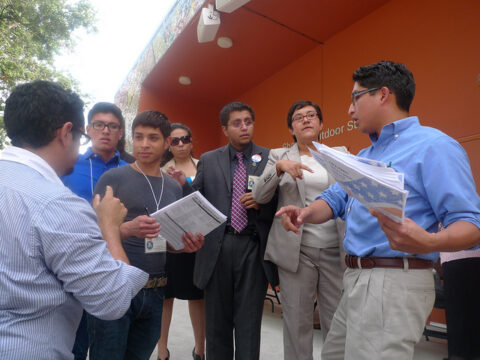Immigration Reform

Lifting Up Cities That Are Welcoming Immigrants
When it comes to immigration policymaking at the state and local level, all eyes have been focused for quite some time on train wrecks like Arizona and Alabama. These are places in which policymakers have chosen to deal with unauthorized immigration by embarking on a path of economic self-destruction—blindly lashing out at immigrants and Latinos no matter what the cost in terms of wasted taxpayer money, labor-force contraction, lost economic growth, community upheaval, and violations of fundamental human rights. Read More

Congress Pits One Form of Legal Immigration Against Another
We recently noted that the only point of agreement in the Republican and Democratic platforms on immigration was on the need for an infusion of green cards for STEM (science, technology, engineering, and math) graduates with advanced degrees from American colleges and universities. A recent poll conducted for the Partnership for a New American Economy and Compete America shows that 76 percent of Americans support the idea as well. If only Congress could draft legislation that simply sought to put that idea into practice. Read More

No Paid Sick Days for Immigrant Caregivers Risky to Workers, U.S. Economy
By Elisa Batista, Women Immigrants Fellow, New America Media. In 91-year-old Elda Frank’s apartment is a scenario that plays out every moment of every day. An immigrant caregiver with no paid sick days scrambles for backup when she becomes ill on the job. In caregiver Paula Osorio’s case, she called Frank’s son, Bruce, and offered to send her partner, Roberto, in her place. Read More

Immigrant Integration is a Two-Way Street
The process by which immigrants integrate into the economic and social fabric of the United States is very much a two-way street. Naturally, immigrants must harbor the desire to climb the socioeconomic ladder of success. But there must be a ladder for them to climb. If the community within which immigrants live and work makes the collective decision to deprive them of opportunities, then their upward mobility is hindered—to the social and economic detriment of the entire community. Yet, if the community actually welcomes newcomers and helps to facilitate their upward mobility, then the community eventually reaps the rewards of having workers and neighbors who are more highly skilled, more integrated, and more heavily invested in the community itself. Read More

What Early DACA Application Numbers Tell Us About the Future of the Program
It hasn’t even been a month since the United States Citizenship and Immigration Services (USCIS) first started accepting requests for deferred action under its Deferred Action for Childhood Arrivals (DACA) initiative, yet the New York Times reported this week that the first approvals are already on their way. The Times also reported that the agency has received 72,000 applications as of September 11—almost double the 40,000 reported in the Wall Street Journal just the day before. That’s not bad at all for a program that was only announced three months ago and put into place by the government in 60 days. Read More

The Economic Advantages of U.S. Citizenship
Becoming a naturalized U.S. citizen has many benefits – citizens can vote and run for public office, bring family members to the U.S., hold certain jobs reserved for citizens, and they are protected from deportation. There are also a range of economic benefits to citizenship, highlighted by the Migration Policy Institute (MPI) in their new report, The Economic Value of Citizenship for Immigrants in the United States. Read More

A Look Backward and Forward at Immigration Platforms
Eight years ago, the similarities between the Republican and Democratic platforms on the issue of immigration reform were striking. The 2012 immigration planks for both parties are equally striking, but for the opposite reason. Where 2004 demonstrated a unified vision of a broken system requiring reform, 2012 represents a virtual breakdown in agreement at least in official party documents, on how to go forward on immigration. Comparing the evolution of the platforms from 2004 to 2008 to 2012 offers some insight into what has gone wrong in the immigration policy debate, and demonstrates why both sides need to come up with new, creative solutions to the continuing immigration policy crisis. Read More

Nativist Group Trivializes the 2012 Latino Vote
The nativist Center for Immigration Studies (CIS) has an implicit message for the Republican Party heading into the 2012 elections: stop worrying about Latino voters and just play to your predominantly Anglo base. Such is the kamikaze message contained within a new CIS report, innocuously titled Projecting the 2012 Hispanic Vote. The report dismisses the claims of innumerable analysts that Latino voters could tip the electoral balance one way or the other in the so-called “battleground” states and, by extension, in the nation as a whole. After all, argues CIS, veterans and senior citizens outnumber Latinos in the national electorate, so why not focus on winning them over instead? This may seem comical to some observers, but CIS is saying it with a straight face. Read More

Why Kobach’s Lawsuit Against Deferred Action is Unlikely to Stand Up in Court
Kris Kobach’s official job title is Kansas Secretary of State. But he is better known for drafting—and being hired to defend in court—state and local immigration laws designed to make undocumented residents “self-deport.” His two most notorious undertakings are Arizona SB 1070 and Alabama HB 56, which have largely been eviscerated by federal courts. Yesterday, Kobach embarked on a new legal escapade, filing a lawsuit to block the Obama administration from granting deferred action to so-called “DREAMERers,” undocumented immigrants who arrived in the country as children. Fortunately, although sure to generate headlines, the lawsuit has little chance of standing up in court. Read More

5 Ways DACA Renews the Conversation on Immigration Reform
There’s no doubt that recent implementation of the Deferred Action for Childhood Arrivals (DACA) initiative is the biggest thing to happen in immigration law in many years. While most of the attention is currently focused on how to make it work, how to apply and how to work out the kinks, it’s important to take a macro view at the ways this program can actually renew the entire conversation on immigration reform. Read More
Make a contribution
Make a direct impact on the lives of immigrants.
